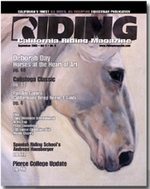Tonya Johnston has turned the love of horses and riding into a productive career as a sport psychology consultant. Tonya Johnston, MA
Sport Psychology Consultant by Susan Nelson
Appeared in
September ’03 issue of Riding Magazine
Tonya Johnston has turned the love of horses and riding into a productive career as a sport psychology consultant. Currently showing her horse on the hunter/jumper circuit with the amateur medals as a main focus, Tonya rides with Nancy Patton in Northern California’s Petaluma. “Growing up and riding I never had anyone to talk to about my fears, nerves or how to communicate with my trainer,” explains Tonya, a lifelong rider. “I saw myself running into all of these mental challenges of the sport.” Realizing how this had affected her performance, Tonya went to UC Santa Cruz for an undergraduate degree in psychology; then earned her masters in sport psychology from John F. Kennedy University in Orinda, where she returned to teach foundation courses in the masters program in optimal performance. “I knew I was interested in sport psychology when I started college, it felt like a great fit. The focus is on being proactive!”
Tonya deals with many facets of the riding game with her clients, some riders want to work on their confidence issues, whether showing competitively or riding at home. They may be preparing for a specific show, finals or moving up to tougher competition levels. Or it might be adjusting to a new horse or trainer; or recovering from a bad fall or injury.
“There doesn’t have to be a ‘problem’ to work with me,” Tonya notes. “Riders who want to be the best at what they do realize they need to cover all of their bases. They see that an extra edge is necessary to accomplish their goals. They have a trainer to perfect their physical skills, while I help them perfect their mental skills.” Tonya loves working with people that are committed to achieving their riding goals. “They realize, by having come to me, just how important the mental aspects are for riding, and riding well.”
Working with issues that have resulted from a fall or injury, Tonya helps clients to recognize that fear can be healthy. It is not about denying or ignoring the fear. She helps them set small goals and build confidence slowly. Often riders have the expectation that they will go back and start right where they left off only to realize that it might take longer to overcome their anxiety. Fear can be rational or irrational. Either way, Tonya helps clients put situations in perspective. She teaches them to realize that they can control certain aspects of their riding and not others, and that both can be dealt with rationally.
Tonya says a new client needs to be aware that they have a lot of mental strengths they just need to take advantage of in more routine ways. “I want to stress that anyone can benefit from sport psychology,” she says. “It’s not always about the winning, it’s more about making the most of your attributes and strengths.” She helps them create as program that will develop these strengths and consistencies. It helps to be open minded to develop tools to take advantage of what strengths they already possess, and learn new techniques.
Tonya likens a rider’s mental strengths to a toolbox. “You have all these mental tools in your tool box. If you get to a show and get nervous, you learn to call on a tool from your box to use that nervousness as positive energy to get you through your riding challenges.”
Building on what you already do well seems to be a main focus of Tonya’s assistance. Tonya sees these tools carried over into her clients’ personal lives as well. The sport psychology techniques are used as life skills, the more you avail yourself of these techniques the more effective they become and you can see the results in your personal and professional life as well.
For 10 years Tonya has been working with riders from all levels and disciplines and she travels throughout the United States doing clinics. Individuals can work with Tonya by phone in sessions that usually last an hour, Tonya finds this method to be quite effective. Normally riders will start to have a new awareness and a new approach to their riding within the first couple of weeks. “It’s wonderful for me to hear the excitement they feel around their progress and their new confidence!”
As a competitive rider, Tonya finds it much easier to work with her clients because they speak the same language: “horse.”


